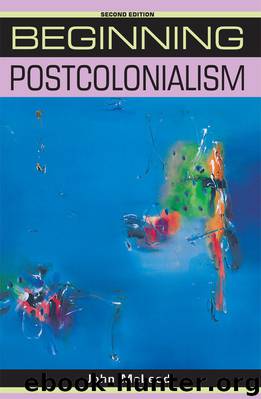Beginning Postcolonialism by McLeod John

Author:McLeod, John
Language: eng
Format: epub
Publisher: Manchester University Press
Published: 2013-01-18T05:00:00+00:00
It is impossible for us, with our limited means, to attempt to educate the body of the people. We must at present do our best to form a class who may be interpreters between us and the millions whom we govern; a class of persons, Indian in blood and colour, but English in taste, in opinions, in morals, and in intellect. To that class we may leave it to refine the vernacular dialects of the country, to enrich those dialects with terms of science borrowed from Western nomenclature, and to render them by degrees fit vehicles for conveying knowledge to the great mass of the population. (Reprinted in The Post-Colonial Studies Reader, second edition, p. 375)
Macaulay’s pronouncement rests upon several assumptions. Knowledge is deemed the enriching possession of the ‘scientific’ West and must be taught to those in India, but the process is not reciprocal. An Orientalist hierarchy is asserted between a knowledgeable, civilised West and an ignorant, savage East. Thus, the education of Indians is part of a civilising process that involves a certain moral improvement – it is not just a process that will heighten intellect and opinion. The education of Indians for the purposes of consolidating power is legitimised by appearing morally just and improving.
This was also the concern of many evangelicals in India at the time who were keen that Indians converted to Christianity. However, it became clear during the early nineteenth century that many Indians objected to the denigration of their own religions by missionaries and the teaching of Biblical scripture in schools. Viswanathan argues that evangelicals coped with this problem by trying to promote Christian morality indirectly through the teaching of English literature. Rather than studying issues such as grammar or diction, English literary texts were presented in profoundly moral terms, with students invited to consider how texts conveyed ‘truths’ at once universal and timeless, yet entirely correspondent with Christian morality. ‘The importance of English literature for this process could not be exaggerated’, argues Viswanathan; ‘as the source of moral values for correct behaviour and action, it represented a convenient replacement for direct religious instruction’ (Masks of Conquest, p. 93). The study of English literature became the study of models of moral worth to the extent that English literature seemed first and foremost about morality. This weaving together of morality with a specifically English literature had important ideological consequences. Literature implied that moral behaviour and English behaviour were synonymous, so that the English literary text functioned ‘as a surrogate Englishman in his highest and most perfect state’ (p. 20). In reading English literature in moral terms, then, Indian students were being exposed to a code of values deemed Christian and universal, yet also specifically identified with the colonising nation.
So, in an Indian context Viswanathan reveals that the teaching of English literature in the colonies was complicit with the maintenance of colonial power. And although it is never wise to generalise, it is fair to say that writers from other colonised locations have often pointed out this relationship.
Download
This site does not store any files on its server. We only index and link to content provided by other sites. Please contact the content providers to delete copyright contents if any and email us, we'll remove relevant links or contents immediately.
The Rules Do Not Apply by Ariel Levy(4950)
Bluets by Maggie Nelson(4541)
Too Much and Not the Mood by Durga Chew-Bose(4324)
Pre-Suasion: A Revolutionary Way to Influence and Persuade by Robert Cialdini(4208)
The Motorcycle Diaries by Ernesto Che Guevara(4080)
Walking by Henry David Thoreau(3948)
Schaum's Quick Guide to Writing Great Short Stories by Margaret Lucke(3368)
What If This Were Enough? by Heather Havrilesky(3302)
The Daily Stoic by Holiday Ryan & Hanselman Stephen(3294)
The Day I Stopped Drinking Milk by Sudha Murty(3184)
The Social Psychology of Inequality by Unknown(3013)
Why I Write by George Orwell(2944)
Letters From a Stoic by Seneca(2788)
A Short History of Nearly Everything by Bryson Bill(2679)
A Burst of Light by Audre Lorde(2588)
Insomniac City by Bill Hayes(2537)
Feel Free by Zadie Smith(2473)
Upstream by Mary Oliver(2384)
Miami by Joan Didion(2364)
